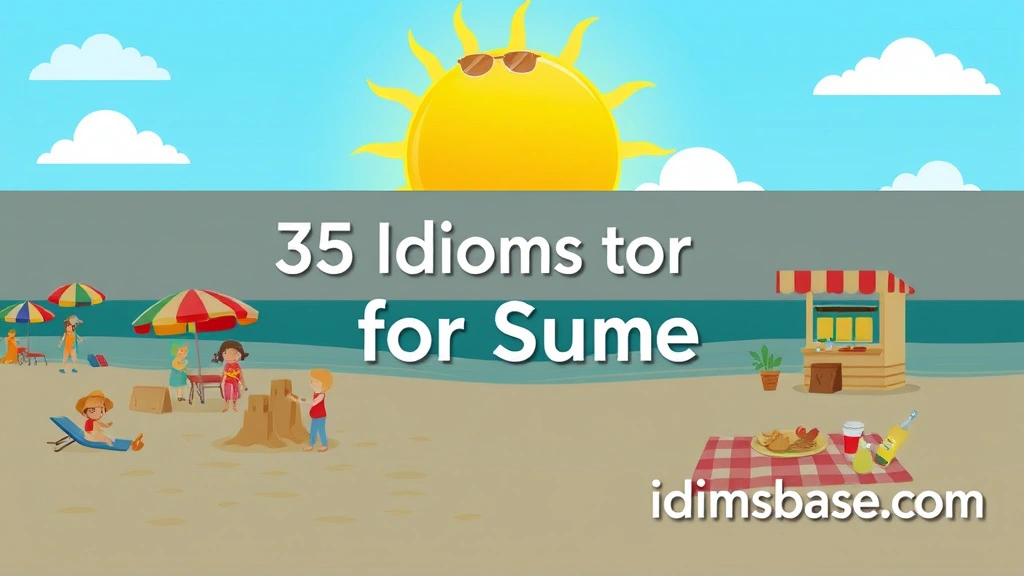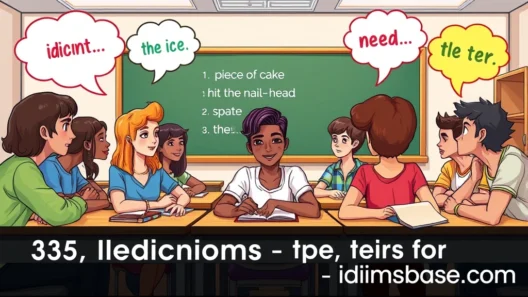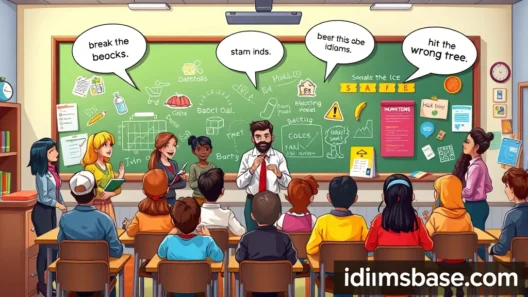Welcome, sunshine seekers and language lovers! As the days get longer and the mercury rises, doesn't it just feel like summer is whispering sweet nothings in our ears? It's a season of vibrant energy, endless possibilities, and, as you're about to discover, a treasure trove of fascinating idioms!
Think about it: how often do we use phrases tied to the weather, the sun, or even a picnic basket without even realizing their deeper, often historical, roots? Idioms are like little linguistic gifts, adding color and nuance to our conversations. They’re the secret sauce that makes English so rich and expressive. And what better time to explore them than during the glorious summer months?
So, whether you're lounging by the pool, planning a beach getaway, or simply dreaming of warmer days, get ready to dive into a delightful collection of 35 summer-inspired idioms. You'll not only expand your vocabulary but also gain a deeper appreciation for the playful side of language. Let's warm up our brains and jump right in!
35 Idioms for Summer
Here's your ultimate guide to summer idioms, complete with their meanings and how you can use them!
-
A Dog Day Afternoon: This isn't about dogs having a good time! It refers to a very hot, oppressive summer day, often in late July or August, linked to the rising of the "dog star" Sirius.
- Example: "It was a real dog day afternoon, so we just stayed inside with the AC on."
-
Soak Up the Sun: To enjoy the sun's warmth, often by lying or sitting in it.
- Example: "After a long winter, I can't wait to soak up the sun on the beach."
-
Make Hay While the Sun Shines: To take advantage of a good situation while it lasts.
- Example: "The kids are happy playing outside, so I'm going to make hay while the sun shines and get some work done."
-
Indian Summer: A period of unseasonably warm, dry weather in late autumn, after a period of cold weather.
- Example: "We had a beautiful Indian summer this year, perfect for hiking."
-
Summer Fling: A brief, often intense romantic relationship that occurs during the summer months.
- Example: "It was just a summer fling, but we had a lot of fun."
-
Summer Breeze: Something easy, pleasant, or refreshing.
- Example: "That new job is a summer breeze compared to my last one."
-
In the Doghouse: To be in trouble or out of favor with someone. While not strictly summer, "dog days" can make people grumpy!
- Example: "I forgot our anniversary, so I'm definitely in the doghouse."
-
Hot Under the Collar: Feeling angry or annoyed.
- Example: "He got hot under the collar when they changed the plans without telling him."
-
The Heat Is On: Pressure is building, or a situation is becoming intense.
- Example: "With the deadline approaching, the heat is on to finish the project."

-
Catch Some Rays: To spend time in the sun to get a tan.
- Example: "Let's head to the park and catch some rays."
-
Brighten Up: To become happier or more cheerful; also, for the weather to become sunny.
- Example: "The sky is starting to brighten up, so maybe the rain will stop."
-
Chase the Sun: To travel to a warm, sunny place, often to escape winter.
- Example: "We're tired of the cold, so we're chasing the sun to the Caribbean."
-
Golden Hour: The period of daytime shortly after sunrise or before sunset, during which daylight is redder and softer than when the sun is higher in the sky.
- Example: "The photographer waited for the golden hour to get the perfect shot."
-
As Right as Rain: Feeling perfectly well and healthy.
- Example: "After a good night's sleep, I feel as right as rain."
-
Come Rain or Shine: Whatever the weather, or no matter what happens.
- Example: "We'll be there for the picnic, come rain or shine!"
-
Every Cloud Has a Silver Lining: Even in bad situations, there is always something good to be found.
- Example: "Losing my job was tough, but every cloud has a silver lining – I found a better one!"
-
Full of Beans: Energetic and lively.
- Example: "The kids are full of beans after their summer vacation."
-
Get a Second Wind: To have a new burst of energy after being tired.
- Example: "I was exhausted, but after a short break, I got a second wind and finished the race."
-
Grin and Bear It: To accept a difficult situation without complaining.
- Example: "The camping trip was miserable, but we had to grin and bear it."
-
Head in the Clouds: Daydreaming or being unrealistic.
- Example: "He always has his head in the clouds when it comes to planning."
-
Hot Potato: A controversial or difficult issue that no one wants to deal with.
- Example: "The budget deficit is a real hot potato for the new government."

-
In the Sunshine: In a happy, prosperous, or favorable situation.
- Example: "After years of hard work, she's finally in the sunshine with her career."
-
Light at the End of the Tunnel: A sign that a difficult period is coming to an end.
- Example: "This project has been tough, but I can see the light at the end of the tunnel."
-
Long Time No See: A casual greeting used when you haven't seen someone in a while.
- Example: "Hey, Sarah! Long time no see! How was your summer?"
-
On Cloud Nine: Extremely happy.
- Example: "She's been on cloud nine since she got into her dream university."
-
Out of the Woods: Out of danger or difficulty.
- Example: "The patient is still recovering, but they're out of the woods now."
-
Piece of Cake: Something very easy to do.
- Example: "Learning to surf was a piece of cake for him."
-
Ray of Sunshine: Someone or something that brings happiness to others.
- Example: "Her cheerful attitude is a ray of sunshine in the office."
-
Recharge Your Batteries: To rest and regain your energy.
- Example: "I need a vacation to recharge my batteries."
-
Take a Rain Check: To decline an offer now but suggest doing it at a later time.
- Example: "I can't make it to the barbecue, but can I take a rain check?"
-
Under the Sun: Everywhere in the world; anything imaginable.
- Example: "We talked about everything under the sun."
-
Warm-Up: To prepare for an activity; also, for the weather to become warmer.
- Example: "Let's do some warm-up exercises before we start running."
-
Weather the Storm: To survive a difficult period.
- Example: "The company managed to weather the storm during the economic downturn."

-
When It Rains, It Pours: When one bad thing happens, others tend to happen at the same time.
- Example: "First my car broke down, then I lost my wallet – when it rains, it pours!"
-
Winter Blues: Feelings of sadness or depression during the winter months. (The opposite of summer joy!)
- Example: "I always get the winter blues, so I look forward to summer."
Frequently Asked Questions
What are idioms, and why are they important?
Idioms are phrases or expressions where the meaning cannot be understood from the ordinary meaning of its individual words. For example, "kick the bucket" means to die, not literally to kick a bucket. They are important because they add richness, color, and nuance to language, making conversations and writing more vivid and engaging. Understanding idioms is crucial for grasping the full meaning of conversations, especially in casual settings, and for sounding more like a native speaker.
How can I learn and remember new idioms?
Learning idioms can be fun! Here are some tips:
- Context is Key: Try to understand idioms in the context of a sentence or situation.
- Visualize: Create a mental image for the idiom, even if it's silly. For "hot potato," imagine someone juggling a burning potato!
- Use Them: The best way to remember is to use them in your own conversations or writing. Start with just one or two new ones a week.
- Group Them: Learn idioms that are related by theme (like these summer ones!) or by a common word.
- Flashcards: Write the idiom on one side and its meaning and an example sentence on the other.
- Read & Listen: Pay attention to how native speakers use idioms in books, movies, TV shows, and podcasts.
Are summer idioms only used in summer?
Not necessarily! While many of these idioms have a clear connection to summer themes (like "soak up the sun" or "summer fling"), others, like "make hay while the sun shines" or "hot under the collar," can be used year-round. Their origins might be tied to summer activities or weather, but their meanings have broadened to apply to various situations. Think of them as expressions that evoke the feeling or imagery of summer, even if it's the middle of winter!
Do idioms vary by region or country?
Yes, absolutely! While many idioms are widely understood across the English-speaking world, some are more common in certain regions (e.g., American English vs. British English) or even within specific communities. For example, "throw a wobbly" (to have a fit of temper) is more common in British English. The idioms in this list are generally well-understood in global English-speaking contexts, but it's always good to be aware of regional variations.
Can using idioms make my English sound more natural?
Definitely! Using idioms appropriately can make your English sound much more natural, fluent, and sophisticated. It shows that you have a deeper understanding of the language beyond just literal translations. However, it's important to use them correctly and in the right context. Overusing them or using them incorrectly can sound awkward, so practice makes perfect!
Key Takeaways
Wow, what a journey through the sunshine-filled world of summer idioms! You've just explored 35 fantastic phrases that can add so much zest to your conversations.
Here’s what we’ve learned:
- Idioms Add Flavor: They're the spice of the English language, making communication more colorful and engaging.
- Context is King: Understanding the situation helps you grasp an idiom's true meaning, which often isn't literal.
- Practice Makes Perfect: The best way to master these phrases is to actively use them in your speaking and writing. Don't be shy!
- Summer's Influence is Wide: From "dog days" to "golden hours," summer has inspired countless expressions that we use all year long.
So, as you step out into the world, whether the sun is blazing or you're just dreaming of warmer days, try sprinkling a few of these idioms into your chats. You'll not only impress your friends with your linguistic prowess but also find yourself enjoying the playful side of English even more. Happy summer, and happy idiom-ing!






